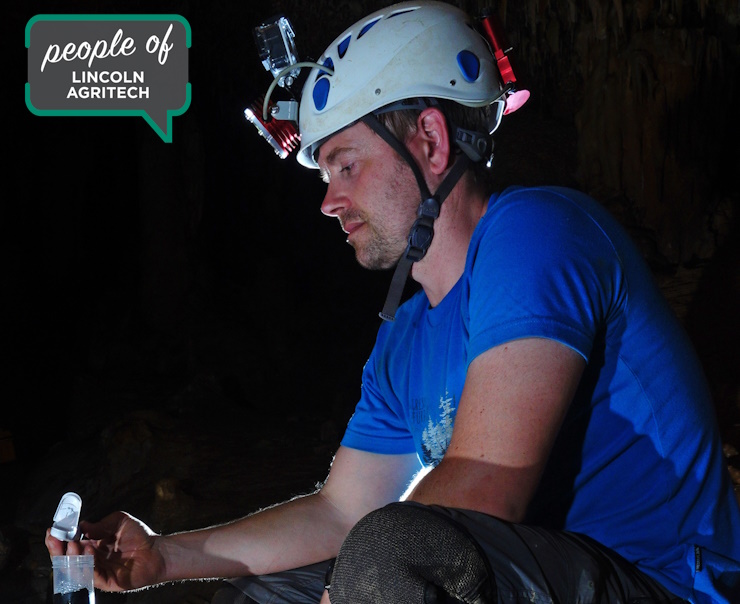Adam Hartland
Environmental Research Senior Scientist Adam Hartland says he’s motivated by knowing he’s doing something unique that also increases our understanding of natural systems.

I’ve always appreciated the sound of waves, and their ability to overcome the urgent drumbeat of clocks, engines and machines. Particularly on gravel beaches, like at Little River; Birdling’s Flat is a magic place for me. Caves are great too. At times underground, the sound of rushing water swamps everything. That’s when I’m most happy.
The idea that we should have a clear idea and path in mind from a young age seems very odd to me. I didn’t, and as a now 45-year-old I’d say I’m beginning to work out what most interests me and what I’d like to do with the remainder of my productive years.
What led you to this job?
As an undergraduate choosing my major, I didn’t know which direction to go in. I was drawn to a degree in environmental science with a professional placement in Australasia. Two years into my studies I still felt as lost and uncertain about my career as when I started. But when I did my placement at NIWA, Christchurch, that all changed, because I saw that scientists can have stimulating careers in research. So after doing student research projects on the Canterbury Plains aquifers, then a PhD on the geochemistry of cave systems, and a postdoc working on groundwater systems in Australia, I found myself as a Lecturer at the University of Waikato.
After 10 years in the university system, I knew I wanted a career change and to move into a faster-paced and commercial setting. I also wanted to be able to lead research projects without the constraints of also being an educator and academic. So here I am.
What does your job involve?
That’s evolving too. I follow research leads, come up with research ideas, write funding applications and provide support to the Environmental Research team here in Kirikiriroa-Hamilton and to our teammates in Lincoln. So far, I’ve spent most of my time working on bids for large government-funded research contracts. These things take a lot of time and are multifaceted, requiring creativity, practicality, strong relationship skills and much more.
I really enjoy having to come up with ideas. Science is an amazing engine for solving problems and discovering fundamental things about the world. I love the process of reasoning from first principles and following where the science takes me.
I’ve been told I jump from one thing to another rather than move linearly along a well-defined research track. I’ve worked on soil and water quality problems, ocean acidification, climate change reconstruction, technology development, all sorts of things. But I’m just following my process and seeing where it takes me, and that’s exciting!
My family are pretty well acquainted with my research work. My partner is also a scientist and there’s a lot of crossover there. For my kids, I have a hard time boiling it down to something they get. Early on, Dad was “saving the planet”, not my words. Now they see some more nuance. I guess my current explanation is “trying to use science to make the world a bit smarter and kinder”. My kids tend to get fairly high-level explanations!
What motivates you?
I need to know I’m doing something unique, that has benefit to someone, somewhere. I feel that there’s a lot done in the name of research that really doesn’t move the needle. We want a world where bright and curious people figure out esoteric stuff, if anything we need more of that!
I also want to increase our understanding of natural systems, and provide workable solutions that don’t just sound good, but work in the real world. The application of science within real-world constraints doesn’t get enough credit in my opinion.
What is the best thing that’s ever happened to you?
Meeting my partner, Dorisel. Hands down.
If you could change one thing about the world, what would it be?
I’d change the way we structure our democracy to mandate that leaders have limited terms of office, say five years, and are selected at random from a pool of qualified candidates, a bit like juries are selected. For example, only qualified economists or suitably trained or experienced professionals are eligible to hold the Treasury portfolio. For me, the desire to become a politician, or to seek power is a red flag and arguably should disqualify someone from elected office.


